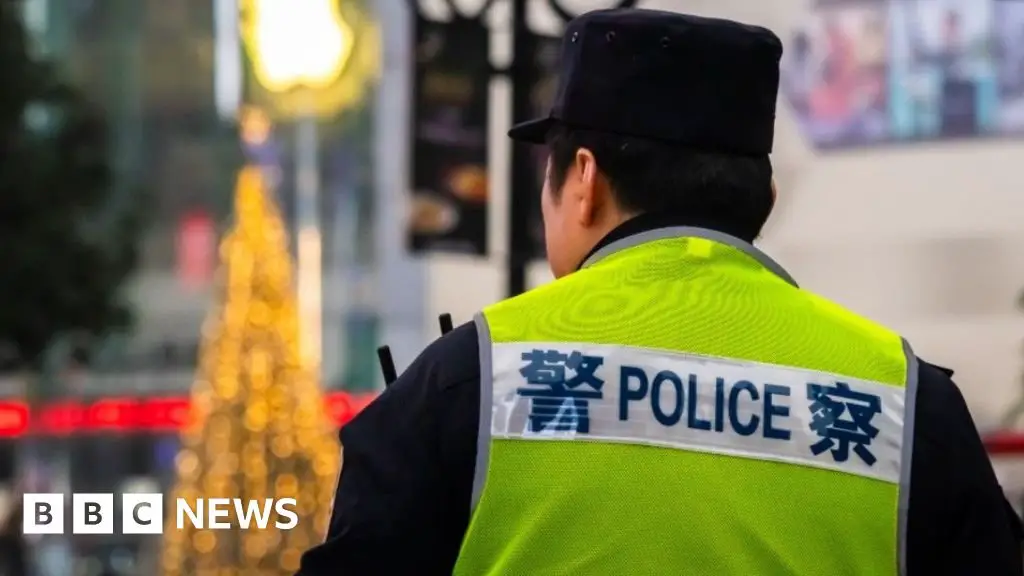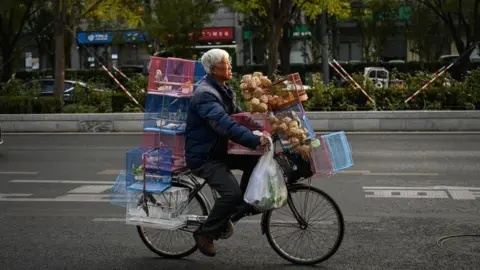 Getty Images
Getty Images“The Chinese people are so miserable,” said one social media post after another mass killing in the country earlier this year. The same user also warned: “There will only be more and more copycat attacks.”
“This tragedy reflects the darkness within society,” wrote another.
Such dire assessments following a spate of deadly incidents in China in 2024 have led to questions about what drives people to murder strangers en masse “Revenge on society”.
Attacks like this are still rare and not new given China’s huge population, says David Schak, an associate professor at Griffith University in Australia. But they seem to come in waves, often as copycat attempts to grab attention.
This year was particularly stressful.
From 2019 to 2023, the police recorded three to five cases each year in which perpetrators attacked pedestrians or strangers.
In 2024, that number increased to 19.
In 2019, three people were killed and 28 injured in such incidents; in 2023 there were 16 deaths and 40 injuries and in 2024 there were 63 deaths and 166 injuries. November was particularly bloody.
On the 11th of this month, a 62-year-old man plowed a car into people exercising outside a stadium in the city of Zhuhai, killing at least 35 people. Police said the driver was unhappy with his divorce settlement. He was sentenced to death this week.
Days later, in the city of Changde, a man drove into a crowd of children and parents outside an elementary school, injuring 30 of them. Authorities said he was angry about financial losses and family problems.
That same week, a 21-year-old who was unable to complete his degree because he failed his exams carried out a knife attack on his campus in the city of Wuxi, killing eight people and wounding 17.
In September, a 37-year-old man sped through a shopping center in Shanghai. He stabbed people. In June, four American instructors were attacked with a knife in a park by a 55-year-old man. And there were two separate attacks on Japanese citizens, including one in which a 10-year-old boy was stabbed outside his school.
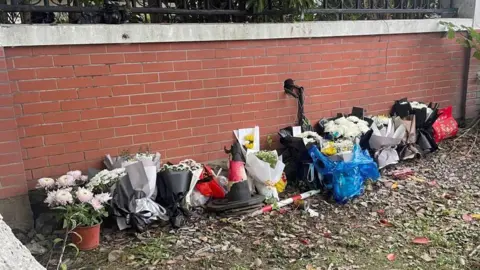 Reuters
ReutersThe perpetrators mostly targeted “arbitrary people” to express their “displeasure with society,” says Prof. Schak.
In a country with extensive surveillance capabilities and where women rarely shy away from walking alone at night, these murders have caused understandable unease.
What led to so many mass attacks in China this year?
China’s slowing economy
A major source of pressure in China right now is the weakening economy. It’s no secret that the country is struggling with high youth unemployment, massive debt and a housing crisis that has drained the life savings of many families, sometimes with nothing to show for it.
On the outskirts of most major cities there are entire housing estates where construction has stopped because indebted developers cannot afford completion. In 2022 the BBC interviewed people camping in the concrete shells of their own unfinished homeswithout running water, electricity or windows because they had nowhere else to stay.
“The optimism actually seems to have faded,” says George Magnus, a research fellow at the China Center at Oxford University. “Let’s use the word “captive” for now. I think China is caught in a kind of cycle of oppression. Social oppression and economic oppression on the one hand and a kind of stalled economic development model on the other.”
Studies appear to indicate a significant shift in attitudes, with a measurable increase in Chinese people’s pessimism about their personal future prospects. A major joint analysis between the US and China, which for years noted that inequality in society was often due to a lack of effort or skill, found in its latest survey that people are now dissatisfied Blaming an “unfair economic system”.
“The question is, who do people really blame?” asks Mr. Magnus. “And the next step of that is that the system is unfair to me and I can’t break through it. I can’t change my circumstances.”
A lack of options
In countries with good media, if you feel that you have been unfairly fired or that your house has been demolished by corrupt developers with the support of local authorities, you could contact journalists to get your story heard. But that is rarely an option in China, where the press is controlled by the Communist Party and is unlikely to publish stories that reflect poorly on any level of government.
Then there are the courts – also run by and for the party – which are slow and inefficient. There has been a lot of talk on social media here about the Zhuhai attacker’s alleged motive: his failure to reach what he believed was a fair divorce settlement in court.
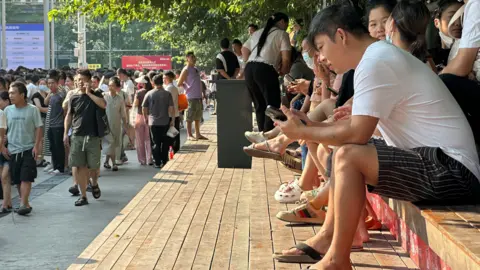 BBC/Xiqing Wang
BBC/Xiqing WangExperts say other avenues to vent frustrations have also been limited or closed entirely.
Chinese people often express their displeasure online, says Lynette Ong, a political science professor at the University of Toronto who has conducted extensive research on how the Chinese state responds to countermeasures from its people.
“(They) go on the Internet and complain about the government… just to vent their anger. Or they organize a small protest, which the police often allow if it is on a small scale,” she explains. “But this kind of dissent, small dissent, has been suppressed in recent years.”
There are many examples of this: increased internet censorship that blocks words or expressions that are considered controversial or critical; cracking down on cheeky Halloween costumes that mock officialdom; or as men in civilian clothes who had apparently been mobilized by local officials, beat up protesters in Henan province external banks that had their accounts frozen.
Dealing with people’s mental and emotional reactions to these stresses was also perceived as inadequate. Experts say China’s counseling services are woefully inadequate and offer no recourse to those who feel isolated, alone and depressed in modern Chinese society.
“Counseling can help build emotional resilience,” says Professor Silvia Kwok of City University of Hong Kong, adding that China needs to improve its mental health services, especially for at-risk groups who have experienced trauma or suffer from mental illness.
“People need to find other strategies or constructive ways to deal with their emotions… so that they are less likely to react violently in moments of intense emotional stress.”
Taken together, these factors suggest that the lid on Chinese society is tightening, creating a pressure cooker-like situation.
“There are not many people who allow mass killings. However, tensions appear to be rising and it does not look like there will be any easing in the near future,” says Mr Magnus.
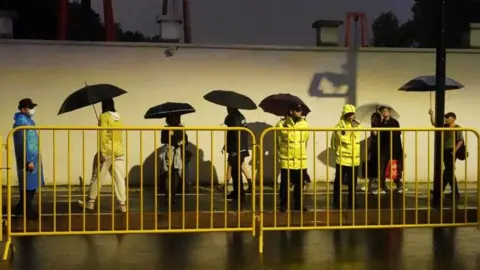 Reuters
ReutersWhat should worry the Communist Party is the commentary from the general public that blames those in power.
Take, for example, this remark: “If the government were truly fair and just, there would not be so much anger and resentment in Chinese society…The government’s efforts have focused on creating a superficial sense of harmony. Although it may appear that she cares about disadvantaged people, her actions have instead caused the greatest injustice.”
According to Professor Ong, while violent attacks occur in many countries, the difference in China is that officials have little experience dealing with them.
“I think the authorities are very concerned because they have never seen it before and their instinct is to crack down.”
When China’s leader Xi Jinping spoke about the attack in Zhuhai, he seemed to acknowledge that pressure in society was increasing. He called on officials across the country to “learn hard lessons from the incident, get to the root of risks, resolve conflicts and disputes early and take proactive measures to prevent extreme crime.”
So far, however, lessons learned appear to have led police to pursue faster response times through increased surveillance rather than considering changes in the way China is run.
“China is entering a new phase, a new phase that we have not seen since the late 1970s,” says Prof Ong, referring to the period when the country began to open up to the world again triggered enormous changes.
“We must prepare for unexpected events, such as many random attacks and emerging pockets of protest and social instability.”


